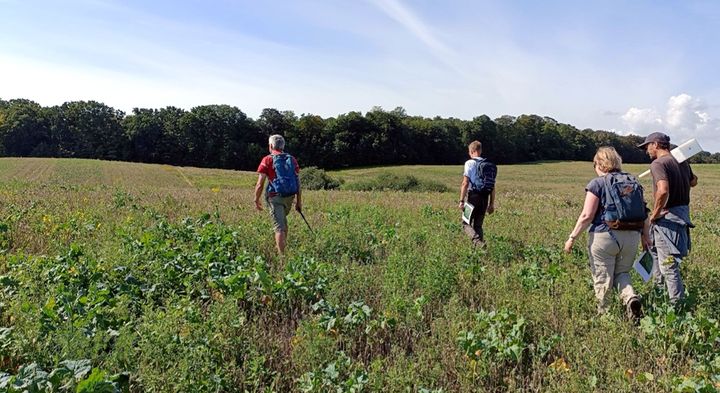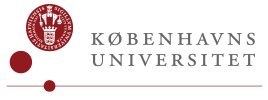Can Soil Microbes Boost Forest Restoration?
Researchers from the Silva Nova Project explore how soil microbiome inoculation could accelerate forest recovery on former agricultural land. By introducing beneficial microbes, they aim to enhance soil biodiversity and ecosystem resilience. A large-scale field experiment in Denmark will now test this innovative approach in practice.

In an opinion paper, researchers from the Silva Nova Project hosted by the Department of Geosciences and Natural Resource Management at University of Copenhagen in collaboration with colleagues from Leiden University (NL) and Tartu University (EE) discuss the potential of soil microbiome inoculation as a tool to overcome the challenges posed by agricultural legacies. A soil inoculum consists of a mix of bacterial and fungal communities, forests plant seeds and soil fauna that once it is introduced in a post-agricultural landscape may be able to boost forest development towards a more resilient and diverse ecosystem.
“Introducing beneficial microbial communities can accelerate ecosystem recover and improve soil biodiversity. However, it is essential to carefully select inoculation types and timings, ensure compatibility between the inoculum and site characteristics, and establish standardized monitoring protocols to assess soil health and biodiversity restoration”, explains Per Gundersen, professor at the University of Copenhagen’s Department of Geosciences and Natural Resource Management and co-author of the paper.
Next steps: a large scale field-experiment
This spring, the Silva Nova project will launch a large afforestation experiment on a post-agricultural field in Sjælland, Denmark. This site will serve as a testbed for studying in situ the effects of soil inoculation, including optimal application methods and quantities, on tree growth, microbial diversity and the overall ecosystem recovery.
About the paper
The opinion paper, published in Global Change Biology, was led by assistant professor Sofia I.F. Gomes of Leiden University. The work is part of the “Silva Nova Project- Restoring soil biology and soil functions to gain multiple benefits in new forests” funded by the Novo Nordisk Foundation (2021-2027). https://ign.ku.dk/english/silvanova/
Article: “Soil Microbiome Inoculation for Resilient and Multifunctional New Forests in Post-Agricultural Landscapes” https://onlinelibrary.wiley.com/doi/10.1111/gcb.70031
Further information please contact
Per Gundersen, Professor, Principal Investigator of the Silva Nova Project
Department of Geosciences and Natural Resource Management
University of Copenhagen
pgu@ign.ku.dk
Sebastian Kepfer-Rojas, Associate Professor
Department of Geosciences and Natural Resource Management
University of Copenhagen
skro@ign.ku.dk
Ludovica D’Imperio, Project Coordinator
Department of Geosciences and Natural Resource Management
University of Copenhagen
ldi@ign.ku.dk
Nøgleord
Kontakter
Per GundersenProfessor, Principal Investigator of the Silva Nova ProjectDepartment of Geosciences and Natural Resource Management University of Copenhagen
pgu@ign.ku.dkSebastian Kepfer-RojasAssociate ProfessorDepartment of Geosciences and Natural Resource Management University of Copenhagen
skro@ign.ku.dkLudovica D’Imperio,Project CoordinatorDepartment of Geosciences and Natural Resource Management University of Copenhagen
ldi@ign.ku.dkOm Institut for Geovidenskab og Naturforvaltning
Vores forskning og uddannelse er med til at løse de store udfordringer vi står overfor, med markante klimaforandringer og et øget pres på naturressourcerne.
Andre sprog
Følg pressemeddelelser fra Københavns Universitet
Skriv dig op her, og modtag pressemeddelelser på e-mail. Indtast din e-mail, klik på abonner, og følg instruktionerne i den udsendte e-mail.
Flere pressemeddelelser fra Københavns Universitet
Fra Stevns til Månen: Dansk-ledet rummission skal kortlægge Månens overflade17.12.2025 06:00:00 CET | Pressemeddelelse
Københavns Universitet skal stå i spidsen for den første danske månemission. Missionen skal kortlægge Månens overflade i hidtil uset detaljegrad, som skal gøre det sikkert at lande og etablere baser på Månen i fremtiden.
Your Christmas decorations may be hiding a tiny bit of badger and toad16.12.2025 09:27:05 CET | Press release
Researchers at the University of Copenhagen have discovered that moss acts as a natural trap for environmental DNA. This discovery opens the door to using moss as a simple, gentle and inexpensive method of monitoring biodiversity – from birds and mammals to fungi, insects and microbes.
Din juledekoration gemmer måske på en lillebitte smule grævling og skrubtudse16.12.2025 09:17:58 CET | Pressemeddelelse
Forskere fra Københavns Universitet har opdaget, at mos fungerer som en DNA-fælde i naturen. Og den opdagelse åbner for mos som en enkel, billig og skånsom metode til at holde øje med biodiversiteten – fra fugle og pattedyr til svampe, insekter og mikrober.
Forskere genopliver gamle ærtesorter i enorm frøsamling: ”Et uudnyttet guldkammer til fremtiden”15.12.2025 10:29:09 CET | Pressemeddelelse
Med en ny AI-metode har forskere fra Københavns Universitet genopdaget 51 gamle ærtesorter, som ikke længere bruges i landbruget, men som kan vise sig lovende til produktion af plantebaserede fødevarer. Metoden er en genvej til at finde nye ressourcer i de grønne skatkamre, som genbankers enorme frøsamlinger udgør.
Fermentering gør havets grøntsager mere spiselige5.12.2025 06:18:59 CET | Pressemeddelelse
Tang har længe været hyldet som en bæredygtig superingrediens – men dens “fiskede” smag er en barriere for mange vestlige forbrugere. Nu viser et nyt studie fra Københavns Universitet, at fermentering med mælkesyrebakterier kan være nøglen til at få tangen til at glide ned.
I vores nyhedsrum kan du læse alle vores pressemeddelelser, tilgå materiale i form af billeder og dokumenter samt finde vores kontaktoplysninger.
Besøg vores nyhedsrum